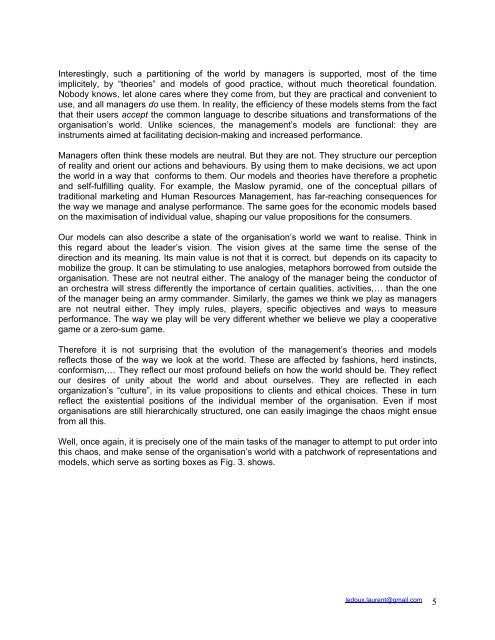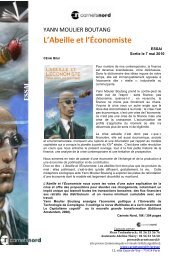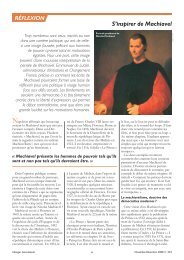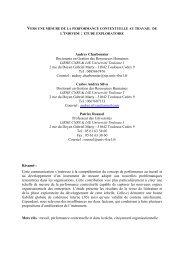Philosophy: The Managers - Philosophie Management
Philosophy: The Managers - Philosophie Management
Philosophy: The Managers - Philosophie Management
You also want an ePaper? Increase the reach of your titles
YUMPU automatically turns print PDFs into web optimized ePapers that Google loves.
Interestingly, such a partitioning of the world by managers is supported, most of the time<br />
implicitely, by “theories” and models of good practice, without much theoretical foundation.<br />
Nobody knows, let alone cares where they come from, but they are practical and convenient to<br />
use, and all managers do use them. In reality, the efficiency of these models stems from the fact<br />
that their users accept the common language to describe situations and transformations of the<br />
organisation’s world. Unlike sciences, the management’s models are functional: they are<br />
instruments aimed at facilitating decision-making and increased performance.<br />
<strong>Managers</strong> often think these models are neutral. But they are not. <strong>The</strong>y structure our perception<br />
of reality and orient our actions and behaviours. By using them to make decisions, we act upon<br />
the world in a way that conforms to them. Our models and theories have therefore a prophetic<br />
and self-fulfilling quality. For example, the Maslow pyramid, one of the conceptual pillars of<br />
traditional marketing and Human Resources <strong>Management</strong>, has far-reaching consequences for<br />
the way we manage and analyse performance. <strong>The</strong> same goes for the economic models based<br />
on the maximisation of individual value, shaping our value propositions for the consumers.<br />
Our models can also describe a state of the organisation’s world we want to realise. Think in<br />
this regard about the leader’s vision. <strong>The</strong> vision gives at the same time the sense of the<br />
direction and its meaning. Its main value is not that it is correct, but depends on its capacity to<br />
mobilize the group. It can be stimulating to use analogies, metaphors borrowed from outside the<br />
organisation. <strong>The</strong>se are not neutral either. <strong>The</strong> analogy of the manager being the conductor of<br />
an orchestra will stress differently the importance of certain qualities, activities,… than the one<br />
of the manager being an army commander. Similarly, the games we think we play as managers<br />
are not neutral either. <strong>The</strong>y imply rules, players, specific objectives and ways to measure<br />
performance. <strong>The</strong> way we play will be very different whether we believe we play a cooperative<br />
game or a zero-sum game.<br />
<strong>The</strong>refore it is not surprising that the evolution of the management’s theories and models<br />
reflects those of the way we look at the world. <strong>The</strong>se are affected by fashions, herd instincts,<br />
conformism,… <strong>The</strong>y reflect our most profound beliefs on how the world should be. <strong>The</strong>y reflect<br />
our desires of unity about the world and about ourselves. <strong>The</strong>y are reflected in each<br />
organization’s “culture”, in its value propositions to clients and ethical choices. <strong>The</strong>se in turn<br />
reflect the existential positions of the individual member of the organisation. Even if most<br />
organisations are still hierarchically structured, one can easily imaginge the chaos might ensue<br />
from all this.<br />
Well, once again, it is precisely one of the main tasks of the manager to attempt to put order into<br />
this chaos, and make sense of the organisation’s world with a patchwork of representations and<br />
models, which serve as sorting boxes as Fig. 3. shows.<br />
ledoux.laurent@gmail.com<br />
5
















